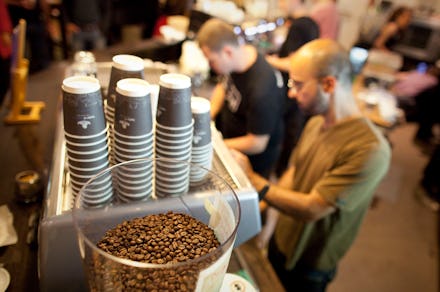If You Love Boutique Coffee Shops Over Starbucks, Here's Why

It turns out small artisanal shops appeal to more than just the hipster in you. And the reason why has to do with their inventory.
Starbucks boasts that customers have a choice of 87,000 drink combinations. That's a lot of ways to dress a simple "venti" cup of coffee. And while the thrill of having so many choices of milk and syrups at your disposal can be thrilling, it also amps up the anxiety of making a final decision. Multiply that by rush hour coffee-break traffic and you gain a new understanding of the phrase "less is more."
According to a 2000 study published in the Journal of Personality and Social Psychology, having too many choices can make for a stressful shopping experience, leaving the casual shopper paralyzed by indecision. In fact, it tends to discourage a consumer from making a purchase altogether. The trick, the researchers say, is in giving consumers fewer choices to begin with (say, as many as fit on a boutique shop chalkboard).
Hence artisanal shops, which offer far fewer items to customers than their more generalist counterparts.
The study isn't new, but the research is still relevant today. Co-authors Sheena Iyengar and Mark Lepper set up a jam display at the front of a grocery store to see how having lots of options might influence a person's likelihood to purchase a given product. Shoppers could stop, sample jam and then proceed into the store and make a purchase if they wanted.
For a few hours, Iyengar's display boasted 24 different types of jam and predictably, a lot of shoppers, 60%, stopped by for a taste. Then she switched things up, displaying only six jams instead. During the hours when fewer jams options were available, only 40% of people entering the store stopped by. The researchers kept a close watch on all the consumers who sampled the jam. They found that even though more people stopped and sampled from the big display, only 3% made a jam purchase that day.
Of those who had much fewer jam choices to sample, 30% went to the jam aisle and bought one. People were far more likely to pin down a choice when they had fewer options to weigh in on. The proof, as some might say, was in the preserves.
"Choice overload" is real. In an article written for Strategy+Business, Iyengar refers to that frustrated feeling one gets when trying to compare and contrast too many options on the spot.
People like choice, she writes, but only the idea of it: "Having a large number of choices makes people feel that they can exercise more control over what they buy. And consumers like the promise of choice: the greater number of options, the greater the likelihood of finding something that's perfect for them."
The researchers also pointed out that the world we live in has become flooded with options. Baskin-Robbins and their 31 flavors is no longer a novelty but a norm. According to Iyengar, "the average supermarket has 45,000 products" and Cold Stone Creamery claims that there are 11.5 millions ways to mix up your ice cream treat. Too many choices might even be clouding your dating life, Iyengar writes. Websites like Match.com give members up to 15 million date possibilities. It seems like somewhere in that number should be exactly the right one.
The reality, however, is that humans tend to agonize over too many choices. We like knowing we have the options, but we'd prefer not to be confronted by them, and that's where the smaller shops have got the big chains beat. That is, until they become mainstream.